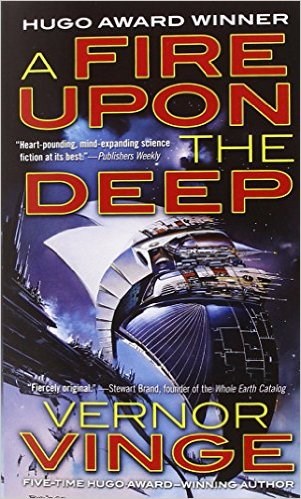Never have I seen a better representation of “alien” than in A Fire Upon the Deep by Vernor Vinge.
In movies and shows such as Star Trek or Star Wars, aliens are usually represented as pretty much like us: two arms, two legs, one head with usually just the ears and the forehead that are different. In Vinge’s work, the aliens are so much more… alien.
After a strange disaster at a research facility, a superintelligent malevolent space cloud threatens humanity. The only escapees from the facility are two children, chased by the angry superintelligence who believes the kids possess the means to destroy it.
The escaped kids manage to crash onto a planet to avoid capture, but without parents or other adults to care for them and no access to the technology they are used to, they only have the help of wolf-like aliens. The wolf creatures only exist as individual intelligent minds when they form a pack: three or more single animals (a single pack) comprise one “person.”
Each individual animal functions as a body part the way we have hands and feet. With these rather unusual creatures and the fact that the wolves’ civilization is a lot like medieval Europe, it’s a bit of a culture shock for the kids. They can only sit and await rescue.
There are several other threads to the story involving the efforts to find and rescue the kids, but the standout to me is the time spent with these aliens. Like so much of the best science fiction and fantasy, it’s the aliens that best reflect humanity. We watch them develop technology, fight wars, argue politics, all in a way that removes normal human prejudices. We see how absurd their issues appear to be from an outside perspective that illustrates to us as readers that our problems could be just as ridiculous. In our current political climate, we could use more introspection.
There are two sequels to A Fire Upon the Deep: the first, A Deepness in the Sky, is only loosely connected. It’s just as good as this book and features yet more inventive aliens. The second sequel, Children of the Sky, is a direct sequel to the events of this book.
A Fire Upon the Deep won the Hugo Award for Best Novel, tied with Connie Willis’ Doomsday Book. Twenty-five years later, I still agree: both are well-deserved winners.
Steven McCreedy is a library technician at Richmond Public Library



